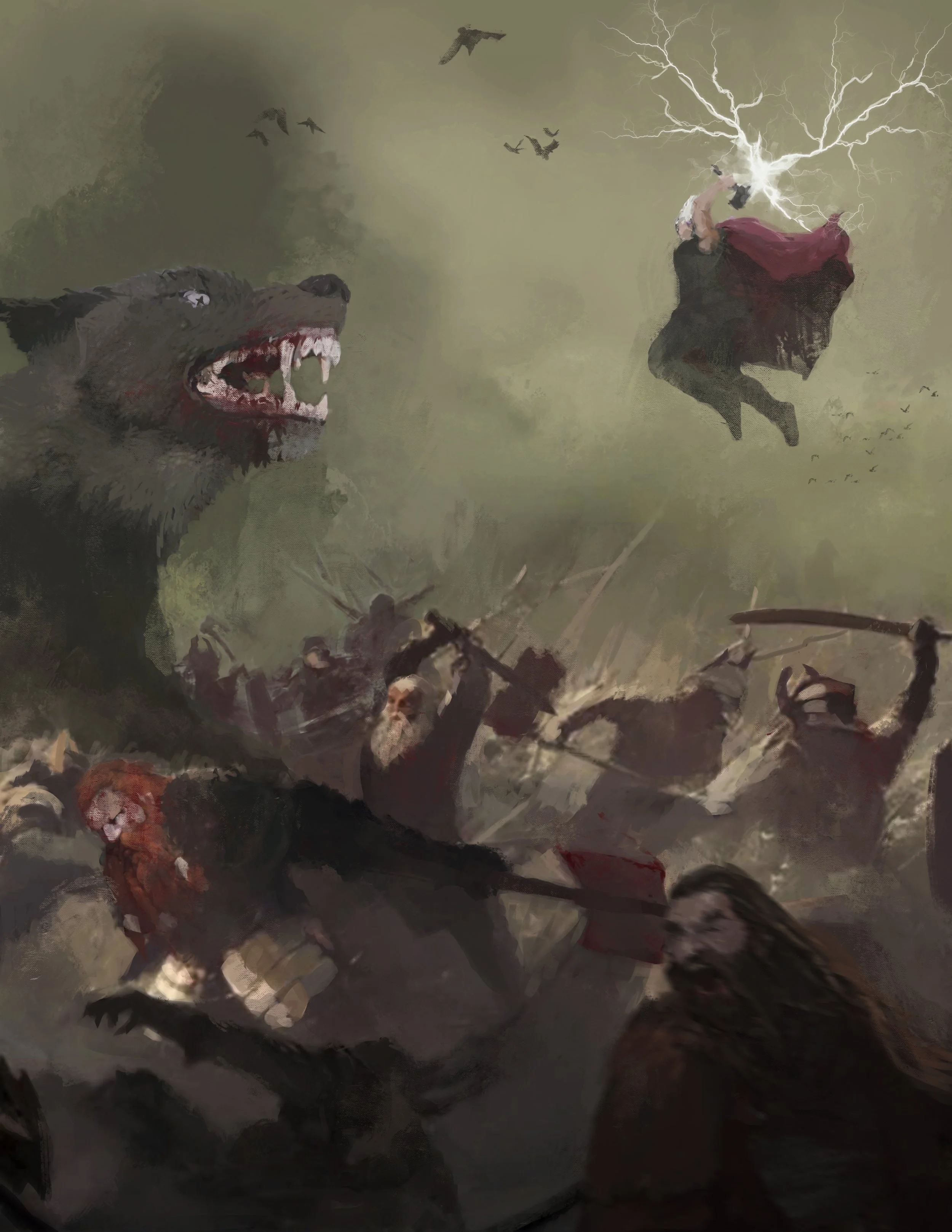
ÚLFHEIMR
THE DARK AGE
THE FALL OF WESTERN CIVILIZATION, RAGNARØKR, AND THE BIRTH OF THE TENTH WORLD.
CHRISTOPHER THOROLF BJØRNSEN
Written, Published, and Printed in Norway
ISBN: 978-82-691370-2-6 (Hardcover)
ISBN: 978-82-691370-3-3 (E-Book)

EXCERPT FROM THE BOOK
17 (Seytján)
Annan Fimbulvetrinn: The Second Great Winter
It is the end of Ýlir (December on the Viking Lunar Calendar), the height of vetrheiðr (winter solstice), and the longest, darkest night of the year. The snow is silently, and at times heavily, falling on the old farmhouse from the Tenth Century ES (late Seventeenth Century CE on Miðgarðr calendar), nestled in a deep forest on the side of a mountain in Jotunheimen, Norðvegr (Kingdom of Norway). The ancestral land of Jötnar (Giants), Troll, Ljósálfar (Light elves), Svartálfar (Black elves), and Dvergar (Dwarves). A great fire is slowly burning in a colossal fireplace seemingly built for Jǫtnar, gently lighting the room, wooden floor, heavy beams and sparse yet imposing furniture in lively hues of red and amber. A woman is softly singing an unintelligible lullaby, while she is preparing what seems to be a feast for a king. She is wearing a dark green dress that gently follows the curves of her perfect body. Her long blond hair are held up around her head with autumn twigs. Her skin is so fair that it reflects the ambient light on her working table. A bearded Norðmaðr (Norseman) is comfortably sitting by the fireplace on a couch of woolen blankets and reindeer hides, holding a young boy on his lap and close to his chest. The child is half asleep, comforted by the pleasant scent of his father’s sweat, and the tone of the man’s deep voice reading harmonious words from Krákumál (Lay of Kraka):
Hjoggum vér með hjǫrvi.
Hitt lœgir mik, jafnan
at Baldrs fǫður bekki
búna veitk at sumblum.
Drekkum bjór af bragði
ór bjúgviðum hausa;
sýtira drengr við dauða
dýrs at Fjǫlnis húsum;
eigi kømk með æðru
orð til Viðris hallar.
I carve hard with my sword.
My soul is content, for I know
that Baldur’s father’s benches
for a feast are made ready.
We shall soon drink ale
from the bent trees of skulls;
a warrior never laments his death
beasts at the house of Fjölnir;
do not speak with higher
words at the hall of Viðris.
The Úlfheðinn pauses for a moment, looks at his son, Þórolfr, who stares at his father’s eyes in apparent awe, and adds:
Sonum mínum man svella
sinn fǫður ráðinn verða…
My sons will rise high
their fathers advice befalls…
As he ends his words, the young man, Bjǫrn, seems unexpectedly startled. He quickly holds his blood tighter and closer to his slowly beating heart. His strong muscles are soon contracting as if he is expecting an attack, while he begins smelling the air and focusing his heightened senses on sounds from the distance, outside in the gloomy forest. As wolves do. The large solid ash door slowly opens moments later, revealing in the outside darkness four large Úlfhéðnar whose skin is as white as snow and eyes as blue as the summer sky. The women, who has turned around to look at the unexpected visitors, has dropped the earthen pot she was holding, which breaks and shatters on the hardwood floor almost silently. The first male slowly enters the wooden house, identifies himself as a Hirðarhöfðingi (Unit Commander) from Ásjárstjórn (Protection Command), and solemnly and quietly says the four words the father had dreaded since the his son had seen light for he first time.
“Það er kominn tími.” (It is time.)
The mother has fallen to her knees and is screeching, hiding her face in both her hands, bawling. The young boy has awakened in shock from his blissful stupor and is trying to understand what is happening. He is burying his face in his father’s underarm, as the unit commander grabs him and tries, as gently as he can, to get him to release his grip of his father’s clothes and beard. Bjǫrn is looking at his son with his first tears in his wide blue eyes, still holding little Þórolfr tight. He just can’t let him go. He knows the time would come, but not this soon. He had been in denial for quite some time now. The Hirðarhöfðingi finally manages to separate son from father. The boy is crying and sobbing, like he has never cried before, desperately trying to reach his father with his arms extended to the point of dislocation, as he is dragged outside of the ancestral house. Þórolfr soon quickly disappears in blowing snow in the darkness of the Norwegian winter, as a swirl of cold from Hel makes its way inside the building and bites, without mercy, the skin of Bjǫrn and the mother of his youth, chilling them to their core.


